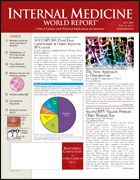First-Ever Effective Therapy for HCV-Related Thrombocytopenia
By Bruce Sylvester
Mitchell L.
Shiffman, MD
BARCELONA, Spain/WASHINGTON, DC—Thrombocytopenia associated with hepatitis C virus (HCV) infection appears either before the initiation of therapy with myelosuppressive pegylated interferon-alpha (PEG-IFN)/ribavirin (Ribasphere) or as a side effect of ongoing therapy with either of these agents. Either way, it is a big problem and thus far untreatable.
IMWR
"Basically, we have had nothing to date to treat this condition in these vulnerable patients," Mitchell L. Shiffman, MD, chief of hepatology and professor of medicine at the Virginia Commonwealth University School of Medicine in Richmond, told at the European Association for the Study of Liver Diseases annual meeting.
"One quarter of my patients has both cirrhosis and platelet counts below 50,000 to 60,000 mm2/L. I can't start them on interferon therapy because of the threat that they will develop treatment-related thrombocytopenia. So this is currently a very difficult situation for the patient and the clinician," Dr Shiffman said.
Severe thrombocytopenia is defined as a platelet count below 50,000 mm2/L. The condition can induce easy bruising and prolonged bleeding. Thrombocytopenia is common in patients with advanced fibrosis or cirrhosis, who may develop portal hypertension and reduced synthesis of blood clotting factors. The condition can also be a side effect of treatment with interferon.
Because there is no FDA-approved drug therapy for severe HCV-related thrombocytopenia, PEG-IFN/ribavirin treatment is usually avoided in this group of patients. And if treatment is already under way, the dosage is reduced, or the therapy is terminated.
However, dose reduction is not a good solution. Clinical studies indicate that patients with HCV who are not maintained at over 80% PEG-IFN/ribavirin standard dosing for the duration of treatment have a significantly diminished clinical response.
Optimistically, Dr Shiffman said, "Things might be changing. There is an agent in clinical trials, eltrombopag, which looks very promising for stimulating platelet production in patients with cirrhosis."
At Digestive Disease Week, researchers presented the results of a clinical trial of eltrombopag, suggesting that it may indeed represent a breakthrough in the treatment of HCV-related thrombocytopenia.
IMWR
This phase 2 study showed that eltrombopag increased platelet counts in patients with HCV before starting PEGIFN/ribavirin treatment. It also enabled patients to maintain healthy platelet counts during the first 12 weeks of antiviral therapy, avoiding the need for treatment termination or dose modification in the majority of patients. Coinvestigator Dickens Theodore, MD, director of clinical development in the oncology group at GlaxoSmithKline, the manufacturer of the drug, told , "Our goal in this study was to see if eltrombopag could increase platelet counts before initiation of pegylated interferon treatment and also maintain platelet counts in hepatitis C patients during the first crucial 12 weeks of treatment, thus allowing optimal dosing of interferon therapy. We found that it was effective on both fronts."
A total of 74 HCV-positive patients diagnosed with compensated cirrhosis who had platelet counts of 20,000 to 70,000 mm2/L were enrolled in the study.
In a 4-week induction trial, patients were randomized to receive 30 mg, 50 mg, or 75 mg eltrombopag once daily, or placebo.
Patients who reached platelet counts >70,000 mm2/L during the 4-week induction phase were permitted to initiate PEG-IFN/ribavirin therapy plus eltrombopag (at the same dosing) for a 12-week antiviral treatment phase. Of the 74 patients in the induction phase, 33% (49) entered the antiviral treatment phase.
The investigators reported that "eltrombopag effectively maintained platelet counts above 50,000 mm2/L in up to 81% of patients during the first 12 weeks of antiviral treatment, counteracting the myelosuppressive effects of PEG-IFN. And eltrombopag use avoided the need for PEG-IFN dose modification in approximately 90% of patients during the first 12 weeks of antiviral treatment."
